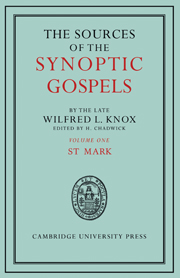Book contents
- Frontmatter
- Dedication
- Contents
- EDITOR'S PREFACE
- PREFACE
- ABBREVIATIONS
- INTRODUCTION
- I The first group of conflict-stories
- II The Twelve-source
- III Jesus and the devils
- IV The book of parables
- V Books of miracles
- VI Nazareth and John the Baptist
- VII Corban and miscellaneous incidents
- VIII A book of localized miracles
- IX The ‘Central Section’
- X The entry to Jerusalem
- XI A second group of conflict-stories?
- XII The warning against the scribes
- XIII The ‘Little Apocalypse’
- XIV The Passion story
- XV The Resurrection story
- SUMMARY
- INDEXES
XI - A second group of conflict-stories?
Published online by Cambridge University Press: 05 July 2014
- Frontmatter
- Dedication
- Contents
- EDITOR'S PREFACE
- PREFACE
- ABBREVIATIONS
- INTRODUCTION
- I The first group of conflict-stories
- II The Twelve-source
- III Jesus and the devils
- IV The book of parables
- V Books of miracles
- VI Nazareth and John the Baptist
- VII Corban and miscellaneous incidents
- VIII A book of localized miracles
- IX The ‘Central Section’
- X The entry to Jerusalem
- XI A second group of conflict-stories?
- XII The warning against the scribes
- XIII The ‘Little Apocalypse’
- XIV The Passion story
- XV The Resurrection story
- SUMMARY
- INDEXES
Summary
The section that follows (Mark xi. 27—xii. 37) looks at first sight like a compilation of conflict-stories incorporated by Mark, and we cannot rule out the possibility that it came to Mark as a whole. But there are grave objections to the view that they form an original unit. We have in the first place three stories of hostile questions addressed to Jesus.
(a) ‘The chief priests and the scribes and the elders’ ask him by what authority he does these things (xi. 27 ff.). (Presumably the rather vague title implies a deputation from the Sanhedrin; the vagueness tells somewhat in favour of the primitive character of the story, since the average Galilean is not likely to have had any very clear idea as to how Jerusalem was governed.)
(b) We then have the deputation of the Pharisees and Herodians with the question as to tribute-money (xii. 13 ff.).
(c) This is followed by the question of the Sadducees as to matrimonial relations in the future world (xii. 18ff.).
The second question is a very subtle trap, since it forces Jesus either to declare himself a rebel or to discredit himself with the nationalist element among the Galileans who are in Jerusalem for the Passover; the third question is presumably intended to discredit Jesus by making him look foolish in front of the crowd.
The other elements in this section, however, do not fit into the scheme at all.
- Type
- Chapter
- Information
- The Sources of the Synoptic Gospels , pp. 85 - 92Publisher: Cambridge University PressPrint publication year: 2011



